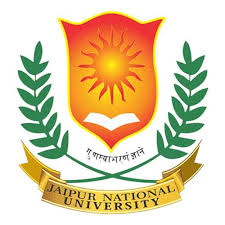General Information
Jaipur National University, commonly referred to as JNU Jaipur, is a well-established State Private University. Founded in 2007 under the Rajasthan State Legislature Act, it emerged from the Seedling Group of Institutions, which had been active in education since 2002.
Located in Jaipur, JNU aims to be a leading multi-disciplinary university offering quality higher education with a focus on research, innovation, and employability. It caters to a diverse student population across a wide array of programs, including a significant presence in medical and health sciences.
Key Recognitions:
Established by a State Act and recognized by the University Grants Commission (UGC).
Accredited by the National Assessment and Accreditation Council (NAAC) with an 'A' Grade.
Consistently ranked by NIRF among private universities.
Holds crucial approvals from major professional bodies: NMC (Medical), AICTE (Engineering, Management, Pharmacy), BCI (Law), PCI (Pharmacy), NCTE (Education), INC (Nursing).
MCI Recogination
Other granted renewal of permission u/s 10(A) for 2020-21. Recognized for 150 seats only in respect of the students admitted in 2016-17 for academic year 2021-22. As per 1st Appeal order No. CDN-16011/4/2023-Coord- NMC dated 30th May 2023 the College has given recognition of 150 MBBS degree seats for fiver years. Annual renewal permission granted for 150 MBBS seats for AY 2024-25 LOP granted for increase of 100 MBBS seats (150-250) for the AY 2024-25.
Campus Facilities
The Campus: Modern Infrastructure in Jagatpura
JNU Jaipur operates from a substantial, modern campus.
Location: Situated primarily in the Jagatpura area, near the Jaipur Airport, Jaipur, Rajasthan.
Campus Vibe: It's a large, well-planned campus featuring contemporary architecture, distinct academic blocks, green spaces, and a professional, dynamic atmosphere suited for a multi-faculty university.
Infrastructure & Facilities:
Constituent Schools/Institutes: Dedicated buildings house its various schools (Medicine, Engineering, Business, Law, Pharmacy, Hotel Management, Life Sciences, Education, etc.).
Learning Resources: A large, modern Central Library with a vast collection of books, journals, extensive e-resources (digital databases, e-journals), and digital library facilities. Departmental libraries offer specialized support.
Advanced Laboratories: State-of-the-art labs are crucial, supporting programs in Engineering (CSE, Biotech, etc.), Medical Sciences (pre-clinical, para-clinical, simulation labs), Pharmacy, Life Sciences, Media (studios), Hotel Management (training kitchens/restaurants), etc.
Hospital Integration: Features its own integrated multi-specialty teaching hospital.
Technology-Enabled: Smart classrooms, extensive computer labs, campus-wide Wi-Fi are standard features.
Auditoriums & Halls: Multiple well-equipped auditoriums and seminar halls for academic and cultural events.
Sports Complex: Comprehensive facilities for various indoor and outdoor sports, including playgrounds, courts, and potentially a gymnasium/swimming pool.
Amenities: Food courts, cafes, banking facilities (ATMs), transportation services, well-equipped hostels, medical support via the campus hospital.
Hospital & Medical Facilities
Leading tertiary care hospital attached to the institution
Healthcare Hub: JNU Institute for Medical Sciences & Research Centre (JNUIMSRC)
Healthcare education and delivery are integral components of JNU Jaipur.
Medical College & Hospital: Yes, the university runs the Jaipur National University Institute for Medical Sciences & Research Centre (JNUIMSRC), which includes both the medical college and a large teaching hospital, located on campus.
JNU Hospital: This is a multi-super specialty tertiary care teaching hospital. Key features include:
Capacity: A significant bed strength (check current figures, often reported as 800+ beds, scaling up).
Services: Provides comprehensive healthcare including 24x7 Emergency, Trauma, and Critical Care (ICUs), modern Operation Theatres, advanced diagnostics (including Radiology like MRI/CT, NABL accredited Labs), Blood Bank, Pharmacy, Dialysis Unit, and OPD/IPD across major clinical specialties and super-specialties.
Accreditations: The hospital often holds quality accreditations like NABH.
Educational Role: JNU Hospital is the primary clinical training site for the university's students in MBBS, MD/MS, Nursing, Pharmacy (Pharm.D), Physiotherapy, and Allied Health Sciences programs, providing essential hands-on patient care experience.
Fee Structure
State University Affordability
Fee Structure: Reflecting Private Status in Rajasthan
As a significant private university in Rajasthan, JNU Jaipur's fees vary widely, with professional courses being more expensive. Medical fees are regulated by the state.
City Details
Hostel & Mess
Campus Living: Extensive Hostel Accommodation
JNU Jaipur provides comprehensive residential facilities for its students.
Accommodation: Separate, well-secured hostel blocks for boys and girls are available within the campus, offering various room types (AC/Non-AC, single to multiple sharing).
Amenities: Hostels are generally modern and well-equipped, providing essential furniture, 24/7 security, power backup, Wi-Fi connectivity, common rooms with TV/recreation, potentially gyms or sports facilities within hostels, laundry services (paid), housekeeping, and warden supervision. Excellent medical support is available via the JNU Hospital.
Dining: Multiple hygienic mess halls and food courts cater to the large student body, offering diverse cuisine options (including North/South Indian, Continental).
Cost: Hostel and mess fees constitute a significant additional annual expense. Depending on AC/Non-AC, room sharing, and food choices, expect costs to range roughly from ₹1,40,000 to ₹2,00,000 or more per year. Confirm the specific rates for different options during admission.
Miscellaneous
Admissions & Career Launch: The JNU Jaipur Pathway
Getting Through the Door:
Jaipur National University Entrance Exam (JNEE): The university conducts its own entrance exam, JNEE (sometimes combined with terms like JNU-MET for Management), for admission to many of its UG and PG programs (including B.Tech, MBA, Law, Pharmacy, Nursing, Paramedical, various Arts/Science/Commerce courses). Performance in JNEE is often a key criterion for admission and scholarships.
Medical (MBBS/MD/MS): Admission is strictly based on qualifying ranks in NEET-UG or NEET-PG. Seat allotment for all quotas (Govt Seat in Pvt, Management, NRI) is done through the Rajasthan State NEET Counselling.
National Scores Accepted: Scores from relevant national exams like JEE (Main) (for B.Tech), CAT/MAT/XAT/CMAT (for MBA), CLAT/LSAT (for Law), NATA (for B.Arch) are also widely accepted, potentially exempting candidates from JNEE.
Merit-Based: Some non-professional programs might offer direct admission based on merit in the qualifying examination (Class 12/Graduation).
Career Kickstart (Placements): JNU Jaipur has a dedicated Training & Placement Cell that works actively on student employability and recruitment.
Industry Interface: Strong connections with a wide range of companies, leveraging its location in Jaipur. Organizes regular campus recruitment drives.
Training Focus: Emphasis on pre-placement training, soft skills, aptitude development, technical workshops, and industry interaction.
Recruiters: Attracts a diverse mix of recruiters from IT (major service and some product companies), Healthcare (hospital chains including its own, pharma), Banking & Finance, Consulting, Manufacturing, Media, Law firms, Education, Hospitality, etc.
Salary Potential: JNU Jaipur generally reports good placement numbers. While highest packages can be substantial, the average package across popular streams like B.Tech (CSE) and MBA typically falls in the ₹4.5 LPA to ₹7 LPA range. Placements for health science graduates (Nursing, Paramedical, Pharmacy) are generally strong within the healthcare sector. Medical graduates follow clinical pathways.
For International & NRI Aspirants
JNU Jaipur actively welcomes international students and has specific provisions for NRI candidates.
Collage Images Gallery
Facilities & Campus Life
Well-equipped Library
Experienced Faculty
Computer Lab
Sports Activities
Heritage Campus
Frequently Asked Questions
Why Consult With Us?
- 15+ years of experience in medical education counseling
- 5000+ students successfully guided
- 50+ partner universities worldwide
- Free initial consultation with no obligation














